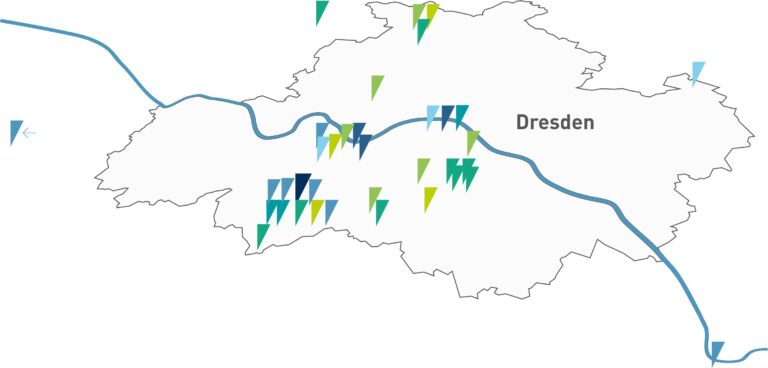DRESDEN-concept Science and Innovation Campus continues to grow – Alliance gains three new members
30.11.2022
The DRESDEN-concept research alliance has taken on three new members in one go. The alliance now boasts 36 partner institutions, which are working together to develop the research hub in Dresden into a DRESDEN-concept Science and Innovation Campus.
NaMLab, the Institute for Saxon History and Folklore (ISGV) (German: Institut für Sächsische Geschichte und Volkskunde) and the Kurt Schwabe Institute for Measurement and Sensor Technology Meinsberg (KSI Meinsberg) (German: Kurt-Schwabe-Institut für Mess- und Sensortechnik Meinsberg) all join the group.
Since the establishment of the DRESDEN-concept alliance in 2010, the research alliance of TU Dresden with local, extramural research and cultural institutions has grown immensely. The number of DRESDEN-concept partners has steadily increased over the past few years from 15 to 36. The partners are united by the goal of promoting Dresden as a research hub while creating and utilizing synergies in research, teaching, infrastructure and administration. Through their close cooperation, they are well on their way to developing Dresden as a research location into an internationally visible DRESDEN-concept Science and Innovation Campus.
 © DRESDEN-concept
© DRESDEN-concept
NaMLab, the Institute for Saxon History and Folklore (ISGV) and the Kurt Schwabe Institute for Measurement and Sensor Technology Meinsberg (KSI Meinsberg) are entering the alliance in the last quarter of 2022. The new partner institutions bolster the already successful cooperative relationships of the DRESDEN-concept partners.
NaMLab combines expertise from both academic and industrial research. The subsidiary of TU Dresden was ranked amongst the TOP 10 most innovative German institutions in terms of its patent portfolio in 2022. Based on its core competence in dielectric materials for microelectronics applications, NaMLab focuses on contributing its expertise in the areas of future reconfigurable and energy-efficient semiconductor devices.
The Institute for Saxon History and Folklore (ISGV) conducts interdisciplinary research on the history and everyday culture of Saxony and its neighboring regions, ranging from the Middle Ages to the present. The focus lies on fundamental research into sources, biographies, location data and visual anthropology, which is presented to the public in online databases and other publications. Further core topics include social transformation processes, migration and cultural transfer, as well as rural and urban worlds of life.
With the addition of the Kurt Schwabe Institute for Measurement and Sensor Technology Meinsberg (KSI Meinsberg), DRESDEN-concept is welcoming a new partner whose headquarters are outside Dresden. This is made possible due to the particularly close relations between DRESDEN-concept institutions, including the joint appointments of the director as well as the doctoral students, almost all of whom are doing their PhD at TU Dresden. Moreover, KSI Meinsberg is involved in the Research Training Group “Supracolloidal Structures: from materials to optical and electronic devices“ (RTG 2767) of TU Dresden. As a non-profit state institute, KSI Meinsberg is responsible for conducting fundamental and application-oriented research in the fields of physical chemistry and electrochemistry, sensor technology and the associated development of novel sensor materials, scientificinstrumentation, as well as for training early-career researchers in the aforementioned fields.
DRESDEN-concept is the research alliance of TU Dresden and local extramural research and cultural institutions. A total of 36 partner institutions have joined forces in the association to bundle synergies and develop the science hub Dresden into a DRESDEN-concept Science and Innovation Campus.
The acronym DRESDEN stands for Dresden Research and Education Synergies for the Development of Excellence and Novelty and emphasizes the focus of the collaboration: by networking across the boundaries of institutions and subjects, DRESDEN-concept offers researchers an ideal place for science and innovation.